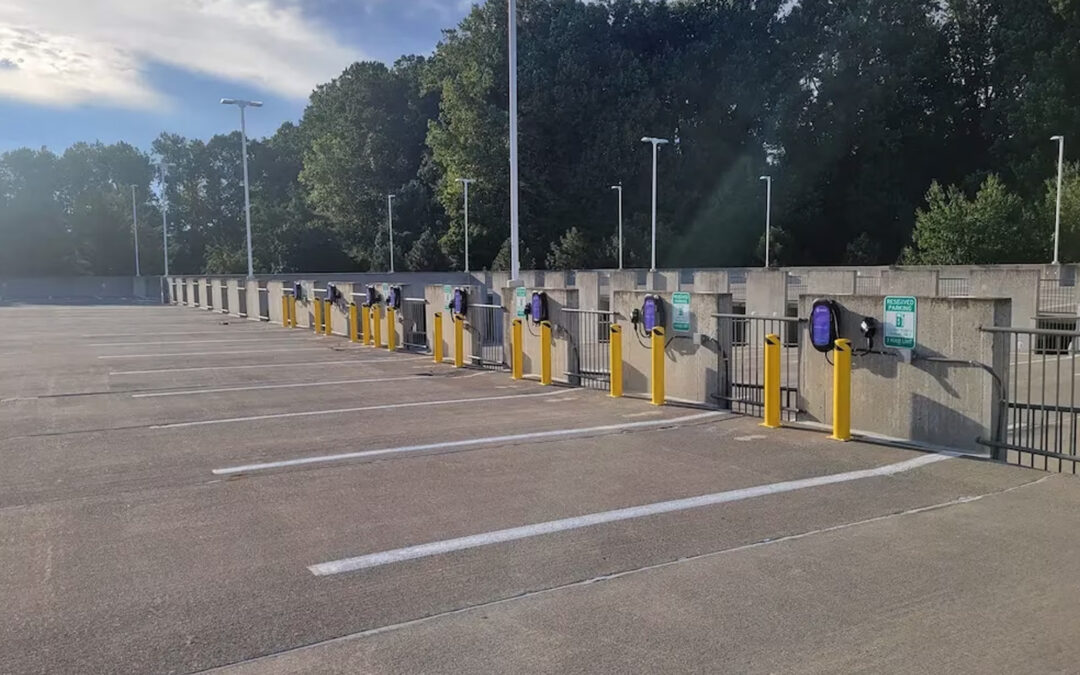The transition to electric vehicle (EV) fleets is no longer a distant future goal; it is a practical and beneficial decision for organizations today. The advantages of adopting an EV fleet extend beyond environmental responsibility, offering businesses numerous financial, operational, and branding benefits. As companies strive to meet sustainability goals and improve overall efficiency, EV fleets can help them align with these objectives while improving their bottom line. With EV fleet charging becoming a crucial component of this transition, it’s also important to explore how it fits into the broader landscape of EV adoption.
Below, we’ll run through seven different benefits of the overall transition to EV trucking fleets:
1. Reduced Carbon Footprint and Environmental Impact
Traditional gasoline or diesel-powered vehicles are a significant source of pollution, contributing to greenhouse gas emissions, smog, and air quality issues. EVs produce zero tailpipe emissions, leading to cleaner air and a healthier environment in urban areas. This aligns with global efforts to combat climate change and reduce the environmental impact of business operations. Many cities and governments are implementing stricter emissions regulations, and businesses with EV fleets are better positioned to comply with these regulations and avoid potential penalties.
The shift to EV fleets can also help businesses meet their corporate social responsibility (CSR) objectives. Companies that adopt EV fleets are often seen as forward-thinking and environmentally conscious, enhancing their brand reputation and appeal to customers and investors who prioritize sustainability.
2. Financial Savings and Reduced Operating Costs
While the initial purchase price of EVs may be higher than traditional vehicles, the total cost of ownership is typically lower due to reduced fuel and maintenance costs. This financial benefit is magnified when considering the broader context of EV fleet charging.
Electricity is generally more affordable than gasoline or diesel fuel, and businesses that invest in EV fleet charging infrastructure can take advantage of lower energy costs to power their vehicles. Many organizations are eligible for government incentives, tax breaks, and rebates that further reduce the cost of purchasing EVs and installing EV fleet charging stations. Maintenance costs for EVs are also significantly lower. Since electric vehicles have fewer moving parts than traditional vehicles, there’s less that can go wrong. EVs don’t require oil changes, transmission repairs, or exhaust system maintenance, reducing the overall cost of vehicle upkeep.
3. Improved Operational Capabilities and Fleet Management
EV fleet charging can be integrated with telematics and fleet management systems, providing organizations better visibility into vehicle performance, energy usage, and charging needs. This enhanced data allows for more accurate monitoring and optimization of fleet operations.
By adopting EV fleet charging infrastructure, businesses can also optimize charging schedules to ensure vehicles are always ready for use while taking advantage of off-peak electricity rates. Fleets are often eligible for government grants and incentives, which can support fleet expansion and operational improvements.
4. Enhanced Employee Satisfaction and Recruitment
Many employees, especially younger generations, are looking to work for companies that prioritize sustainability and environmental stewardship. By implementing an EV fleet, businesses can appeal to environmentally conscious employees and demonstrate their commitment to reducing their environmental footprint.
Providing EV fleet charging stations at the workplace can further enhance employee satisfaction, as many individuals who own personal electric vehicles will appreciate the convenience of being able to charge their cars while at work. This perk can improve employee retention and position the company as a desirable place to work.
5. Aligning With Sustainability Goals and Industry Trends
Adopting an EV fleet allows organizations to align with global and industry-specific sustainability goals. Many industries, particularly those with high transportation needs, are under pressure to reduce their carbon emissions and adopt more sustainable practices.
By transitioning to an EV fleet, companies can reduce their environmental impact and future-proof their operations in the face of changing regulations and customer demands. Businesses that fail to adopt more sustainable practices may face a competitive disadvantage in the coming years.
6. The Flexibility and Scalability of EV Fleet Charging
EV fleet charging can be easily scaled to accommodate a growing fleet, so charging infrastructure grows alongside the business’s needs. Many EV fleet charging solutions are designed to be adaptable, allowing businesses to add new charging stations as their fleet expands.
The flexibility of EV fleet charging options also means businesses can implement various charging solutions, such as fast chargers for quick turnarounds and slower, more cost-effective chargers for overnight charging. This adaptability allows fleet managers to tailor their charging strategy to their specific operational needs, optimizing energy usage and fleet performance.
7. Future-Proofing Your Business With EV Fleets
As the world moves toward a more sustainable and environmentally conscious future, businesses transitioning to EV fleets are positioning themselves for long-term success. EV fleets offer immediate financial and operational benefits and help companies future-proof their operations in the face of changing regulations, consumer preferences, and industry trends.
Is your fleet interested in making the transition to an electric future? See how Lonestar Integrated Solutions can assist the entire process!
Consequences of Not Adopting an EV Fleet
Failing to adopt an EV fleet can lead to several missed opportunities and challenges for businesses. Here are some key consequences of sticking with traditional vehicles:
- Increased operational costs due to rising fuel prices and maintenance for internal combustion engines.
- Missed sustainability targets, resulting in negative environmental impacts and potential reputational damage.
- Reduced eligibility for government incentives and tax credits aimed at promoting electric vehicles.
- Higher long-term costs as EV technology becomes more accessible and affordable.
- Limited access to growing EV-friendly infrastructure, such as dedicated parking and charging stations, affecting operational efficiency.
Make Your EV Fleet Transition Smooth With the Assistance of Lonestar Integrated Solutions
At Lonestar, we’re committed to making your EV fleet transition hassle-free. We provide expert guidance, tailored solutions, and top-tier EV fleet charging infrastructure to help your organization make the switch. Serving the entire state of Texas, we offer the knowledge and resources to ensure your fleet runs efficiently while reducing your carbon footprint. Let’s power Texas together!

